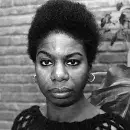
Nina Simone
Nina Simone was a singer, pianist, songwriter, and civil rights activist. She recorded in many genres–from soul and jazz to gospel and popular music. Called the “High Priestess of Soul,” she is among the most prominent popular singers associated with the civil rights movement and is regarded as one of the most influential recording artists of twentieth-century jazz, cabaret, and R&B.
Born Eunice Kathleen Waymon in North Carolina, she displayed prodigious musical talent at an early age, and performed at her family’s Methodist church. In 1950, Simone studied at the Juilliard School with Carl Friedberg while preparing for an audition at the Curtis Institute of Music. She was denied admission–an experience she later attributed to racial discrimination. To support herself, she began playing piano at a nightclub in Atlantic City and sang to her own accompaniment, launching her career as a jazz and soul vocalist.
She made her debut with Little Girl Blue in 1958. The success of the album’s first single–George and Ira Gershwin’s “I Loves You, Porgy”–established her reputation and became a Top 20 hit. She went on to record more than forty albums up to 1974. In the 1960s Simone added protest songs, became a friend of Martin Luther King, Jr. and Malcolm X, and performed at civil rights demonstrations. Her 1964 song “Mississippi Goddam” exemplifies this commitment. Her popularity grew as she added folk and gospel selections as well as songs by Screamin’ Jay Hawkins (“I Put a Spell on You”) to her repertoire.
Disillusioned with American racism and political repression, Simone left the United States and lived in Liberia, Europe, and the Caribbean, eventually settling in France. In 1991, Simone published her autobiography, I Put a Spell on You (the title of her famous 1965 album). Simone received several awards and honors, including the Jazz Cultural Award (1966), the National Association of Television and Radio Announcers’ Female Jazz Singer of the Year (1967), multiple Grammy nominations, and a Grammy Hall of Fame Award (2000).